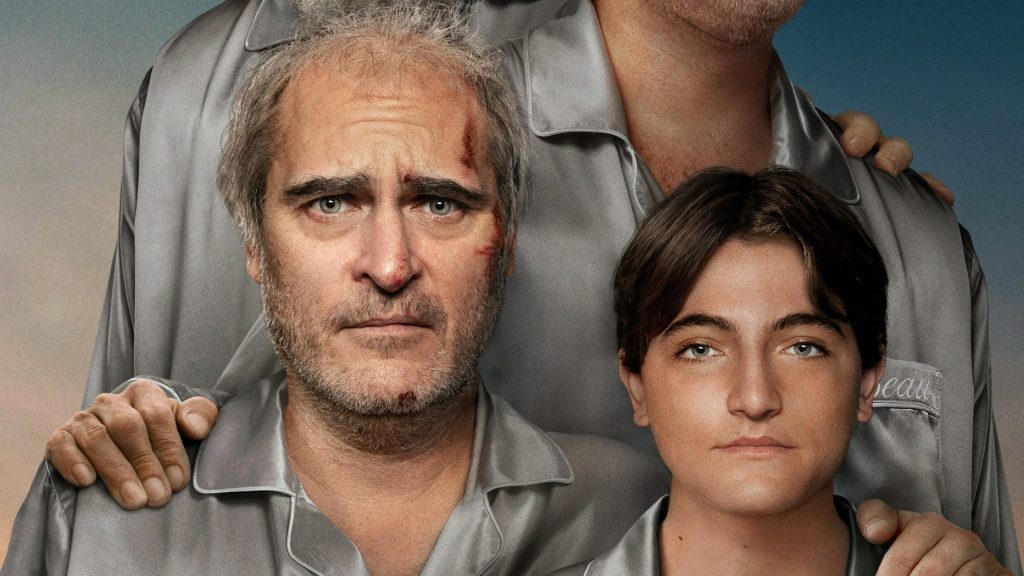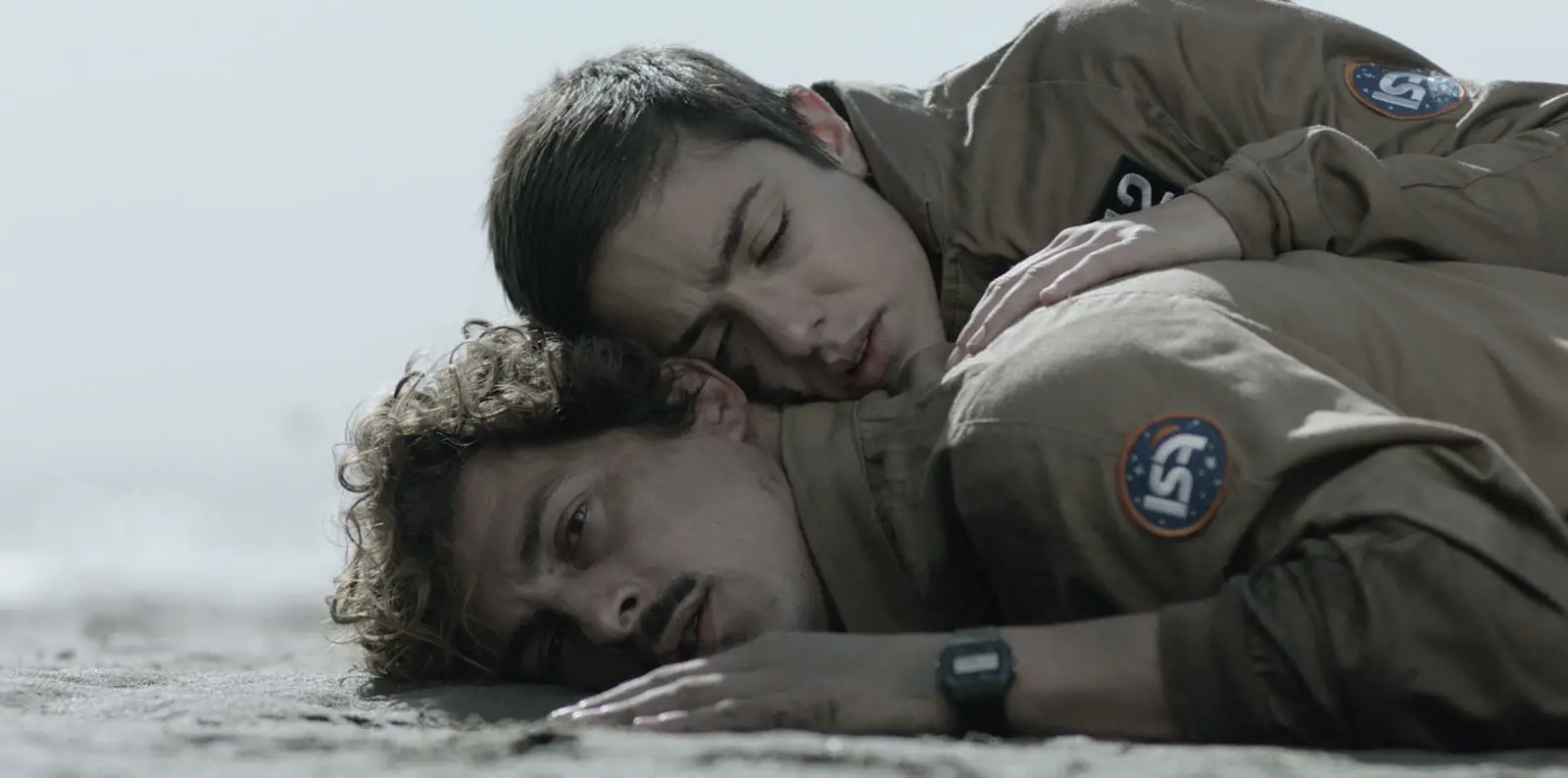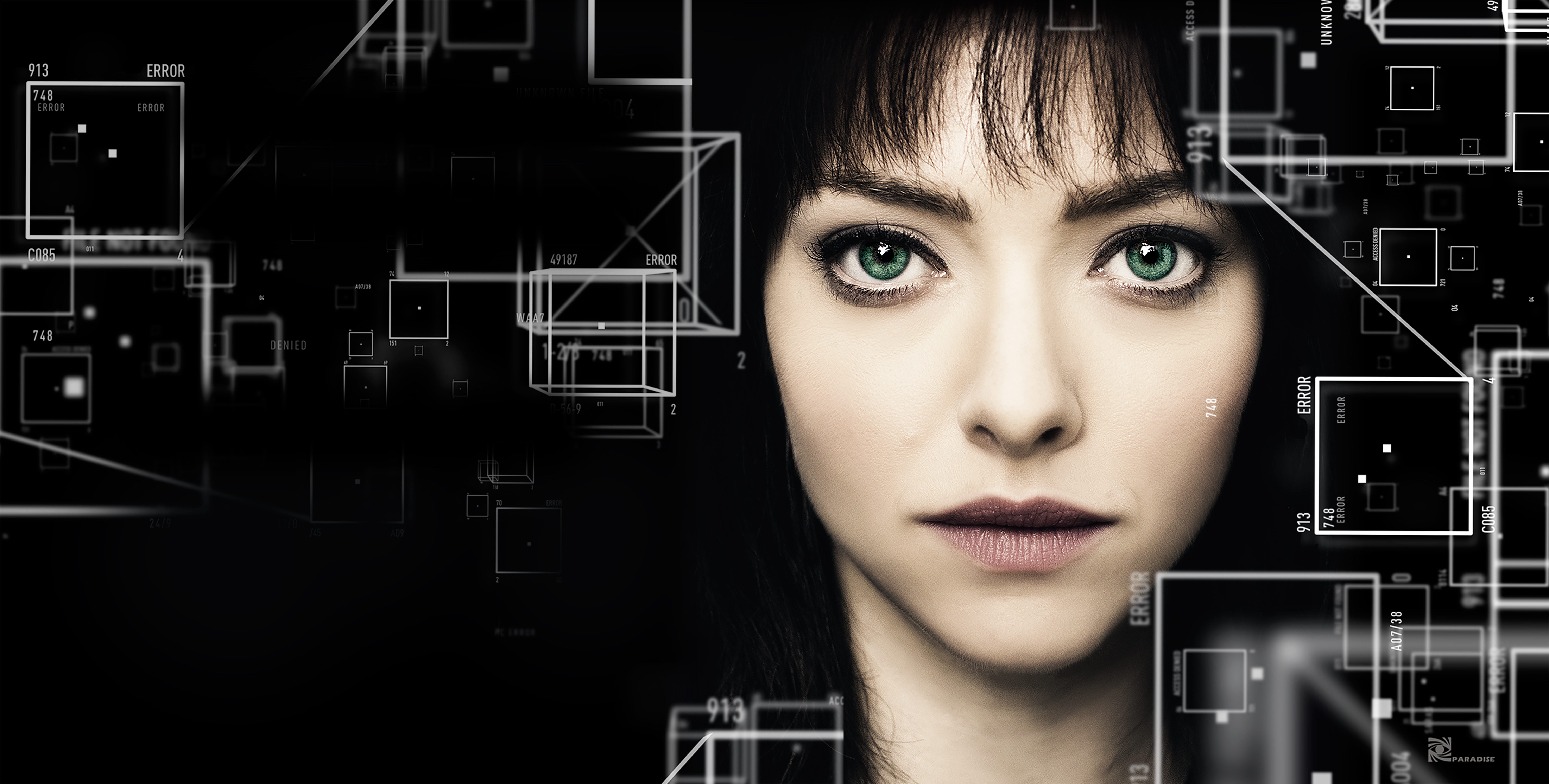Title: Beau is Afraid
MPAA Rating: R
Director: Ari Aster
Starring: Joaquin Phoenix, Patti LuPone, Amy Ryan, Nathan Lane
Runtime: 2 hr 59 mins
What It Is: Beau (Phoenix) is an anxiety-ridden, meek, middle-aged man whose day-to-day life consists of living in fear of the Hellish chaos outside of his apartment building. A mix of a poverty-stricken population rampage outside, screaming, wailing, dancing, toting weapons, running around nude, murdering, and running soup kitchens. Following a visit to his therapists, Beau prepares to fly out to see his mother (LuPone) the next day, though due to strange, random obstacles, is barely able to get any sleep, and ends up losing his apartment key and luggage in the most stressful manner possible, resulting in him missing his flight, to his mother’s immense disappointment. Soon after, Beau receives a call that his mother died, leaving him to make a tumultuous and disorienting journey to the funeral at her house.
What We Think: There’s obviously a lot to unpack here, and if you’ve already seen this long-awaited film, you have at least a little bit of an idea of how ambitiously deep it goes into its storytelling, lore, subtext, imagery, and so forth. From what I’ve heard others say about this film, including those from social media, YouTube reviews, and within my own theater screening, people are only just scratching the surface of what the Hell it is Aster is talking about. Hopefully within this compact review–and added analysis–we can get some conversations going about what this movie is trying to say.
I’ll be talking about this film in two parts, namely, the movie on the surface, and then the movie below the surface, as Aster himself enjoys creating stories that have this subversive structure as if the movie has its own sort of soul or spirituality. I will be using story elements, moments, and device examples as to make connections with its underlying messages, which are many and will be a bit difficult for me to shove in here, so bear with me, but I have a lot concerning this movie to get off my chest so I can move on with my life.
We’ll start with what we see, face value, on the surface of the movie. It’s an amazingly well-produced film. Everything about it and its use of resources is done with the finesse of an obviously experienced and talented director. The performances are beyond incredible, and I’d fight to say this is in Phoenix’s top ten performances for me, and like Toni Colette in her role for Hereditary, I totally expect him to get stiffed the Oscar nom for portraying such a self-sacrificing, out-there, extreme role. There are moments that solely rely on his performance to provide anything other than the strange story being told, which Phoenix, without fail, lands with such emotional intensity that his expression felt entirely tangible, completing the bridge of vicariousness to the audience and allowing us to understand the hardship of being that character. Or at least, he did so for me, but it’s an otherwise amazing performance that you would watch the movie for alone. The rest of the cast also follows, with the beautiful Amy Ryan being perfectly cast as a character that would otherwise seem suspicious, but like Beau, you want to believe her kindness and maternal grace is true, the rest of her family, including Nathan Lane as the husband, are effectively terrifying. Actually, that’s to say that almost every character in this film other than Beau is frankly terrifying, because, at least for a while, you have no idea what their real angle is, or if they’re even real people. Is this a setup? Is this Hell? Is this within Beau’s own mind? I don’t think Beau even really knows. Also not to mention that, in short, Patti LuPone absolutely slays as Beau’s mother.
Landmark performances aside, other technical aspects add to the dreamlike scenario, with Bobby Krlic returning from Midsommar to score, and Pawel Pogorzelski from Hereditary and Midsommar on cinematography. You could say the Aster gang is back together, and I feel that a lot of the aspects and shortcomings that I felt from Midsommar were amended when it comes to Beau. As surreal, disjointed, and tweaky as this movie is, it still feels like a fluid, cohesive work, to where you feel you’re watching this man’s nightmarish journey straight from his head, which is probably the idea, so on this scale and considering the complex narrative, everything was delivered so successfully and beautifully. It’s an incredibly well-made film, and nothing goes to waste.
As for the story that we see–obvious themes would be concerning Beau’s emotions and their catalysts. You’ll hear anyone talking about this film starting out with “it’s a surreal dark comedy-horror about this guy’s anxiety and depression, which he has thanks to his overbearing mother.” To get more technical and specific, Beau has more in common with dark absurdist, expressionist 70s Italian comedy dramas than it does with any “dark comedy” itself. A lot of the aspects and the voice of the film itself reminds of the works by arthouse filmmaker Lina Wertmüller, who often communicated about masculinity, social status, politics, and war in her film through a dark comedic absurdist lens, which includes films like Seven Beauties and Swept Away. I would also compare to the Canadian 2020 art house tradegicomedy Laughter by Martin Laroche, which I wasn’t the biggest fan of when I reviewed it for Fantastic Fest, but effectively communicates dark themes through strange circumstances and emotional surrealism. I would also add a further comparison to my previous prediction that Beau is to Aster as Synecdoche, New York (or even I’m Thinking of Ending Things) is to Kaufman, which after viewing, I would confirm my suspicions to be entirely true (and that’s a win for me). Add the element of the weight of the intensified “Jewish guilt” you can experience from the delightful Shiva Baby, and the imagining of the effects of a meta corporation, such as in Meow Wolf’s art installation experience Omega Mart (which is here in Vegas, and I spent hours on investigating with feverish determination).
The content of the film itself is horrifying, but less so in the Hereditary sense, and more so in the broader, worldview perspective. But sure–it can be funny. Personally, I wasn’t laughing as I found more of the comedy comparable to Greek Tragedy or mythology, but people in the theater were definitely laughing at nearly every extra-bizarre moment. For that, I would say it could be an entertaining movie for many, though still disorienting, you could be along for the ride and still enjoy how grotesque and confusing that ride is. But for those who want to pick apart the film and try and dig for what it’s communicating other than “Beau is sad and he has mommy issues,” I would like to defend Beau as being a wonderful mystery for introverts and private watchers to consume by themselves, or in smaller groups, as while the audience I was with was having a ball, all I wanted was to frankly tell them to shut the hell up so I could pay attention to every single word and detail.
So now I can move on to more of what I think is really at hand behind the narrative of Beau is Afraid, which is a lot so I’m just going to be throwing a lot of things out there, of course, substantiated by events and clues in the film. I’ll be marching into some MAJOR spoiler territory, so if you haven’t yet seen the film, please move on to my final grade.
When I said it felt like we’re watching this guy’s nightmare straight from his head, that is what is exactly intended. The film literally kicks off with the traumatizing event of Beau’s birth, being forced through the womb into a life that he didn’t choose, straight from his little baby POV we hear his mother screaming at the doctors as to why he isn’t crying for her, and he is forcibly made to cry with a smack on the bottom, followed by the title in neon blood-red show letters.
Beau is us, we are Beau. Beau’s mother is not just his mother. The city he lives in is not a real city. The obstacles and people Beau comes by are nearly all fabricated as “tests,” except for the theater troop (at least… I think?). Let’s dive in.
We’ll start with Beau. He is our portal, our everyman. He’s just as confused and disoriented as we are, going through the motions of repressed trauma. Beau is an object of control, a consumer made to present themselves as whole and pure. He is controlled by fear: fear of his mother, who is a titan and a God. Yes, I’m saying Beau’s mother is a God, or is positioned in the place of God, at least in the framing of this narrative, and Beau is the son of suffering. Now although it’s still somewhat ambiguous to me as to how real this aspect of Beau’s life is, as there’s a duality to the story element itself, Beau has a twin, or at least what he perceives to be a twin that also represents everything he was forced to “put away” because of his mother trying to control him. Beau is someone with deep-set abuse and has not recovered from childhood trauma, in actuality, because it’s still ongoing. His twin, his “missing self,” is foreshadowed in the film, namely in a scene that stuck out to me after thinking about it afterward. Despite all the dangers in his apartment complex and the invasion of safety and privacy that Beau experiences, the real danger is an aforementioned brown recluse spider that’s loose in the building. After all the discomfort Beau has to live with, the real killer was in his apartment all along, foreshadowing the real villain in the narrative has been with him, lurking, and unforeseen until provoked, coming to a head in this particular scene when Beau, after finding out his mother is dead, reclines to the bathtub only to find a man his age struggling to cling to the ceiling right above him, fearful from the events before. Both men are now fearful, but the man on the ceiling is a hard reference to Beau’s twin in the attic. The terrified man drops onto Beau into the bath after losing his grip when the recluse crawls all over him. The two scream and spin around in the tub, entangled, much like twins in the womb. They try to avoid the brown recluse spider, a reference to their mother. The two spin around for an uncomfortably long time before Beau leaves, naked and out of his mind, before literally being stabbed, shot by a paranoid cop, and hit by a bus. The comedy is surely in the towering events, but still, Beau would rather leave the tub with the man and the recluse in it and brave the knowingly harsh, dangerous world outside than risk being bit and dying a poisonous death–a metaphor that sets up the dynamic between Beau, and the source of all his terror: MOM. Also acknowledging the thing in the attic–yes I know you know what I’m talking about–is the manifestation of Beau’s repressed sexuality that his mother’s literally held hostage from him all these years, now grown so big with time and age.
Beau’s mother, in short, is a metaphor for systematic oppression. As a character, she’s the most powerful, controlling, and self-serving force in the film. You could even say that the film really revolved around her the entire time, as she is the center of its universe, Beau and everyone else is just caught up in it, because they have, or perceive having, no choice. Beau’s mother is a lot of things. She’s the Sauron in Aster’s “Jewish Lord of the Rings,” but in a much more realistic application, she’s so much more. You could say she’s the puppet master of all things evil in reality, with comparisons to mega-corporations, religion, God, child molesters, war-hungry governments, and dictators, all at once. They all have control through fear in common. Everything Beau encounters is not without his mother, Mona’s meddling, which you’ll see as Amy Ryan’s character, who I’m pretty sure was in the beginning originally working a soup kitchen, was recruited or even forced to play a role in testing and holding Beau hostage, giving him looks and even passing him a note warning him not to incriminate himself. It seems initially she cared, though turns on Beau when her repulsed and angry daughter swallows paint in front of him and dies, which, considering it’s made clear Mona can literally pay people off to kill themselves later in the film, was likely a stunt meant to make Ryan’s character turn on Beau. Characters like this are always surrounding Beau, if not throwing themselves at him, demanding something from him, only to later be seen returning as cogs in Mona’s machine, members of her organization, or audience, all just to test Beau’s “purity,” rather than humanity. It’s because of this, Mona is basically Hitler. Beau can’t do anything right, because he’s human. In the eyes of dictatorships, an upstanding citizen is one that follows, that doesn’t question authority, that provides strength and all their resources. Beau is an individual who suffers from seeing himself as all “shortcomings,” not being shaped into what his mother desires him to be. And boy, desires is the right word, as Mona starts off as possessive, and only grows more and more obsessed with control and is less and less masked as love. As a boy, Beau is shown sleeping in the same bed as Mona, his personal space often being invaded by hers, and she talks to him as if seducing him in a hypnotic sort of Orwellian brainwashing rhetoric–which is pretty sick, but it doesn’t even stop there, considering comparisons between her and other mega-industries that put up the front of providing for the individual, expecting them to be practically perfect as a follower, and then punishing them when humanity or circumstances ‘get in the way.’ Mona’s business is rather vague, other than it seems she manufactures and owns the production of many household items, stores, and even medications. MW (Mona’s business) is found everywhere, making everything–even the logo shows up at the beginning of the movie, suggesting MW owns or has some part in making the film. MW is the pharmaceutical industry, commercial industries, providing vague and possibly unsafe productions to the masses. I think this could also explain Beau’s increased disorientation throughout the film, seeing as he’s constantly being given MW medications by the untrustworthy host family and his own therapist. In reality, the pharmaceutical industry is a corrupt cycle of expensive and/or life-altering medications that lead to more medications. You can continue to make connections there. Mona and MW also have similarities with religion, or at least religious institutions. We can source this specifically to the “pure,” anti-sex standards set for Beau, and the inconsistent, one-sided, binary, tone-deaf morality applied to the individual, stripping them of much of their human expression, coming to a head in the VERY religiously-coded last ‘judgment’ scene, where Beau is judged based on how good of a person he is, based on nuanceless conclusions about Beau’s character. The film proves Mona, not just as a character, but as a representation of these monolithic industries, as a villain to not only Beau, but to humanity itself, grooming its subjects to be soldiers, to be pure, to be actors, to be poster boys, and so forth. Much like how Synecdoche, New York was a tragicomedy about how the human experience can or can’t be controlled in order to heighten the worth and meaning of a life, Beau is Afraid expands on this by making the statement that we are being controlled, and does so religiously, spiritually, and atheistically all at the same time. All the storytelling elements and narrative can be taken as seriously or read as close to reality as you want, but everything is a vehicle for a much larger message of the death of the individual, in all senses of the word.
Now, I could go on for ages. But my brain is busted, the bags under my eyes have doubled, and I need an Advil and a nap, so let’s wrap this thing up, for now.
Our Grade: A, An exhausting, expansive, chaotic, and hypnotizing cosmic joke of a movie, Beau is Afraid is a uniquely strange triumph that is as bizarre as it is finely constructed. Everything about it is not only done well but with exceptionality and unabashed creativity. Fun, horrifying, and engaging, it’s a film worth re-viewing and chewing over for as long as it sticks with you, which, it will likely do for the rest of your recent memory. I hope its means of obscurity and complexity don’t lead to its message going over the heads of audiences in exchange for its insane production and its themes can outlive the spectacle, so I’ll continue vouching for viewers to try to step up how they view and deconstruct what they see in this movie. But nonetheless, it’s the return of arthouse movies like this that prove that cinema is still alive and kicking but does so with the intention of being far more personal and confrontational. I hope its powerful existential edge isn’t lost on folks, and while in the broader scope of things, it’s a story that’s actually been told throughout time, it’s provided to us through fresh, bombastic, and hyper-creativity that will leave a long-lasting impression, as Hellishly unpleasant as it may be. Thinking back on it, it’s like the film equivalent to listening to a Swans or The Residents album.






